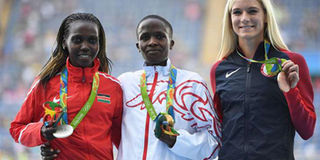IAAF’s new rules for change of nationality

Kenya's Hyvin Kiyeng Jepkemoi (silver), Kenya-born Bahraini Ruth Jebet (gold) and USA's Emma Coburn (bronze) pose during the podium ceremony for the women's 3000m steeplechase final during the athletics event at the Rio 2016 Olympic Games at the Olympic Stadium in Rio de Janeiro on August 15, 2016. PHOTO | AFP
What you need to know:
- The IAAF also set an age restriction to the transfers.
- Russia remains banned from the sport over massive doping.
- World athletics body freezes change of citizenship until July, but says athletes wishing to transfer from one country to another to wait for at least three years in new changes.
The world athletics governing body on Tuesday upheld its ban of Russia from the sport over massive doping and also announced strict new rules to manage the change of nationality by athletes.
In its Council meeting in Birmingham, England, the International Association of Athletics Federations (IAAF) said Russia’s anti-doping agency (RUSADA) had met some “but not all” conditions set for their reinstatement into the sport.
The IAAF’s medical expert Rune Andersen said the sport’s anti-doping task force had “recommended to the IAAF Council and the Council accepted that RUSAF (the Russian athletics federation) not be reinstated”.
“Because while many reinstatement conditions had been met, there are several that still have not been satisfied,” Andersen told a press conference in Birmingham.
“For example, RUSAF and RUSADA have still not provided a test distribution plan for 2018 that shows an adequate amount of testing of Russian athletes.”
Andersen added that RUSAF “has still not demonstrated that it has fixed previous legal issues that meant it was unable to enforce provisional doping bans.”
The International Olympic Committee lifted its ban on Russia at the end of the Pyeongchang Winter Games last month.
Russia had been banned from the Olympic movement over allegations it put in place a system of state-sponsored doping at the 2014 Russian-hosted Sochi Winter Games.
A team of 168 Russians competed in Pyeongchang under the banner of Olympic Athletes from Russia.
The IAAF Council, meanwhile, maintained its freeze on athletes’ change of nationalities until its next meeting in July.
IAAF President Seb Coe they had agreed on a number of fresh measures to control the change of passports, key among them that there will be “a minimum three-year waiting period for athletes wishing to transfer from one country to another.”
The IAAF also announced that a review panel will be established by the athletics governing body “to determine the credibility of the applications.” “There must be evidence that countries are offering full citizenship to the applicants and an athlete can transfer only once,” Coe told the press conference.
The IAAF also set an age restriction to the transfers, announcing that an athlete cannot transfer from one country to another before he or she reaches the age of 20.
“Ideally, the vest that you start your international career with is the vest you should end your international career with. With a few exceptions,” Coe said.
The IAAF Council also accepted recommendations on restrictions in competition based on hyperandrogenism which will be tabled at the Court of Arbitration in Sport with an aim of implementing new rules in November.





